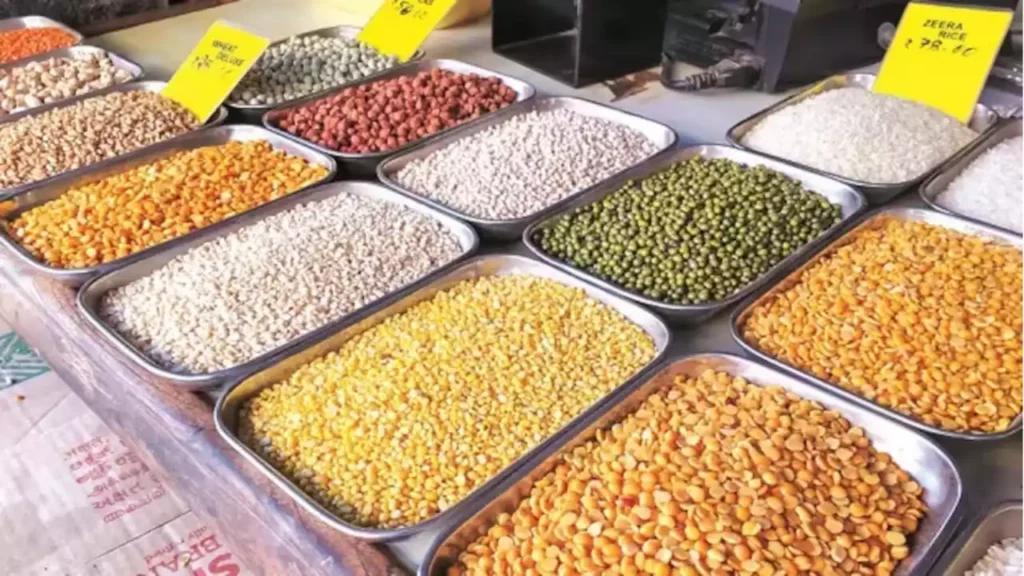Despite implementing several measures, including offering various incentives to farmers, India continues to rely on imports of pulses to meet its domestic needs.
Imports of pulses nearly doubled in the fiscal year 2023-24, reaching a total of USD 3.74 billion.
Nonetheless, the official figure remains undisclosed, but estimates indicate that shipments have surpassed 45 lakh tonnes in the recently concluded fiscal year 2023-24, compared to 24.5 lakh tonnes the previous year.
According to government sources, negotiations are underway with new markets such as Brazil and Argentina to secure long-term contracts for pulse imports, aimed at meeting domestic demand and stabilizing prices.
Continue Exploring: Despite open import policy, tur dal prices rise by over 10% in a month
Brazil is set to supply over 20,000 tonnes of urad, with negotiations for arhar imports from Argentina nearing their final stages.
Additionally, the government has secured contracts with Mozambique, Tanzania, and Myanmar for pulse imports.
The recent increase in imports aims to bolster domestic supply and maintain price stability.
Earlier, the government permitted duty-free imports of urad and arhar until March 31, 2025, and yellow peas until June of this year.
Pulse inflation is a significant concern for the government, especially during ongoing election processes. Recent data indicates pulse inflation stood at 17 percent in March and 19 percent in February of this year.
In an effort to control prices, the government implemented stock limits on pulses starting Monday, April 15, and urged states to remain vigilant against hoarding activities.
Continue Exploring: Indian households ditch tur dal for cheaper lentils amid skyrocketing prices
Despite the government’s implementation of various incentives such as guaranteed purchase and higher Minimum Support Price (MSP), domestic pulse production has declined over the past 2-3 years. Estimates from the Ministry of Agriculture indicate that pulse production in 2023-24 is projected to be 234 lakh tonnes.
Last year, production reached 261 lakh tonnes.
In 2019-20, domestic pulse production stood at 230.25 lakh tonnes. However, following various government incentives in 2020-21, production increased to 254.63 lakh tonnes. Subsequently, in 2021-22, it further rose to 273.02 lakh tonnes. However, in 2022-23, production declined to 260.58 lakh tonnes.
This fiscal year (FY24), Kharif production is anticipated to decrease from 76.21 lakh tonnes to 71.18 lakh tonnes. Urad production is projected to decrease from 17.68 lakh tonnes to 15.15 lakh tonnes, while Moong production is expected to decline from 17.18 lakh tonnes to 14.05 lakh tonnes.
Continue Exploring: Retail food inflation eases to 8.52% in March 2024 as prices of pulses and oils decline marginally
According to experts, the decrease in domestic output is also attributed to unpredictable climate conditions in key producing regions.
However, there is also concern over the reduction in pulses sowing area over the last 3-4 years, declining from 307.31 lakh hectares in 2021-22 to 257.85 lakh hectares in 2023-24. Over two years, the sowing area decreased by 16 percent, accompanied by a nearly 14 percent reduction in production.
The Reserve Bank of India has emphasized that food price pressures are presenting challenges in achieving the target inflation rate of 4 percent, with the price of pulses playing a significant role in inflation figures.
India, being a major consumer and producer of pulses, fulfills a portion of its consumption requirements through imports. The country’s primary pulse consumption includes chana, masur, urad, kabuli chana, and tur.
